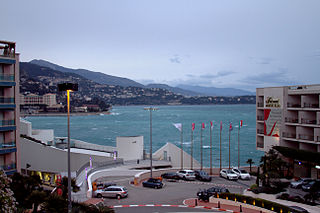Facts
The facts of the case were not complex, and were set out in the judgment: [3]
The goods with which the action and counterclaim are concerned ("the goods"), were stolen in England from the lawful possession of the plaintiff who was the owner of them at the time of the theft and was domiciled in England and Wales. They were subsequently taken to Italy and sold and delivered by a third party to the second defendant under a contract made in Italy, and as to the contractual rights of the parties governed by Italian law, the goods also being at the time of such sale and delivery, physically situate in Italy.
The goods were thereafter delivered by the second defendant to Christie's in London for sale there by auction by Christie's on his behalf. Some of the goods were sold in England by Christie's on his behalf, but before the proceeds of sale were paid over by them to the second defendant or the balance of the goods were sold, the plaintiff asked for a received undertakings from Christie's not to part with the proceeds of sale and not to part with the possession of the balance of the goods then remaining unsold pending determination of the issues between the plaintiff and the second defendant. The plaintiff neither knew of or nor consented to the removal of the goods to Italy or any subsequent dealings with or movements of them up to the time when the said undertakings were given.
The case was heard by way of determination of a preliminary issue, and the certified point for determination was:
Whether upon the basis of the agreed facts set forth in the schedule ... English domestic law or Italian domestic law is to be applied to the issue whether the plaintiff or the [second] defendant ... has title to the goods with which this action and the said counterclaim are concerned and to the proceeds of sale of those goods ...
The pleaded claims were for detinue and conversion. Slade J noted that if the issues were to be determined under English law, then the plaintiff would likely succeed, as under English law title can never pass to a thief. However, if Italian law was to be applied, then the second defendant would win because under Italian law "a purchaser of movables acquires a good title notwithstanding any defect in the seller's title or in that of prior transferors provided that (1) the purchaser is in good faith at the time of delivery, ... (3) the purchaser is not aware of any unlawful origin of the goods". [4]
Judgment
Slade J noted that the editors of Dicey & Morris, The Conflict of Laws (9th ed., 1973) stated that the validity of a transfer was determined by the place of the goods at the time of the transfer. But, he noted, this was subject to five specific exceptions, including where the location of the goods was "unknown", where the foreign law was repugnant to public policy, or where the transfer is not in good faith. However, none of the exceptions were pleaded or relied upon.
He noted that the general rule has been accepted since Cammell v Sewell (1858) 3 H&N 617 (aff'd (1860) 5 H&N 728). He also referred to the rule being upheld in Re Anziani [1930] 1 Ch 407 and quoted Devlin J in Bank Voor Handel en Scheepvaart NV v Slatford [1953] 1 QB 248 at 257 stating: "There is little doubt that it is the lex situs which as a general rule governs the transfer of movables when effected contractually."
Counsel for the plaintiffs, John Mummery, acknowledged these cases but sought to distinguish them as being inapplicable to a case of clear theft so closely connected to England as the lex fori. He also pointed out it is accepted that for English law property may have different locations (legally speaking) for different purposes. Slade J expressed himself to be attracted by the argument, but that it was devoid of authority. Accordingly, the plaintiff was thrown back on trying to show that Italian law should be disapplied as a matter of public policy. However, there was no authority for that proposition and, the case being by way of preliminary issue, there was no evidence as to the precise effect of Italian law beyond the second defendant's pleaded case. The Court referred to American authorities which suggested that "the law of a state into which chattels have been surreptitiously removed without the knowledge of an owner and against his will does not apply its law to divest the title of the absent owner", [5] as well as the US case of Edgerly v Bush (1880) 81 NY 199.
On balance the court upheld the general rule, and approved as authoritative the statement in Cheshire & North's Private International Law (10th ed., 1979): [6]
... the proprietary effect of a particular assignment of movables is governed exclusively by the law of the country where they are situated at the time of the assignment. An owner will be divested of his title to movables if they are taken to a foreign country and there assigned in circumstances sufficient by the local law to pass a valid title to the assignee. The title recognised by the foreign lex situs overrides earlier and inconsistent titles no matter by what law they may have been created.
Nemo dat quod non habet, literally meaning "no one can give what they do not have", is a legal rule, sometimes called the nemo dat rule, that states that the purchase of a possession from someone who has no ownership right to it also denies the purchaser any ownership title. It is equivalent to the civil (continental) Nemo plus iuris ad alium transferre potest quam ipse habet rule, which means "one cannot transfer to another more rights than they have". The rule usually stays valid even if the purchaser does not know that the seller has no right to claim ownership of the object of the transaction ; however, in many cases, more than one innocent party is involved, making judgment difficult for courts and leading to numerous exceptions to the general rule that aim to give a degree of protection to bona fide purchasers and original owners. The possession of the good of title will be with the original owner.
In tort law, detinue is an action to recover for the wrongful taking of personal property. It is initiated by an individual who claims to have a greater right to their immediate possession than the current possessor. For an action in detinue to succeed, a claimant must first prove that he had better right to possession of the chattel than the defendant, and second, that the defendant refused to return the chattel once demanded by the claimant.

Raffles v Wichelhaus [1864] EWHC Exch J19, often called "The Peerless" case, is a leading case on mutual mistake in English contract law. The case established that where there is latent ambiguity as to an essential element of the contract, the Court will attempt to find a reasonable interpretation from the context of the agreement before it will void it.
Choice of law is a procedural stage in the litigation of a case involving the conflict of laws when it is necessary to reconcile the differences between the laws of different legal jurisdictions, such as sovereign states, federated states, or provinces. The outcome of this process is potentially to require the courts of one jurisdiction to apply the law of a different jurisdiction in lawsuits arising from, say, family law, tort, or contract. The law which is applied is sometimes referred to as the "proper law." Dépeçage is an issue within choice of law.
Trover is a form of lawsuit in common law jurisdictions for recovery of damages for wrongful taking of personal property. Trover belongs to a series of remedies for such wrongful taking, its distinctive feature being recovery only for the value of whatever was taken, not for the recovery of the property itself.

Macmillan Inc v Bishopsgate Investment Trust plc [1995] EWCA Civ 55, [1996] WLR 387 is a judicial decision relating to English trusts law and conflict of laws case from the Court of Appeal. The issue arose in relation to frauds conducted by the late Robert Maxwell.

In trust law, a constructive trust is an equitable remedy imposed by a court to benefit a party that has been wrongfully deprived of its rights due to either a person obtaining or holding a legal property right which they should not possess due to unjust enrichment or interference, or due to a breach of fiduciary duty, which is intercausative with unjust enrichment and/or property interference. It is a type of implied trust.
Characterisation, or characterization, in conflict of laws, is the second stage of the procedure to resolve a lawsuit that involves foreign law. The process is described in English law as Characterisation, or classification within the English judgments of the European Court of Justice. It is alternatively known as qualification in French law.
Incidental questions in private international law with respect to the problems and elements discussed below
In conflict of laws, the choice of law rules for tort are intended to select the lex causae by which to determine the nature and scope of the judicial remedy to claim damages for loss or damage suffered.

Smith v Hughes (1871) LR 6 QB 597 is an English contract law case. In it, Blackburn J set out his classic statement of the objective interpretation of people's conduct when entering into a contract. The case regarded a mistake made by Mr. Hughes, a horse trainer, who bought a quantity of oats that were the same as a sample he had been shown. However, Hughes had misidentified the kind of oats: his horse could not eat them, and refused to pay for them. Smith, the oat supplier, sued for Hughes to complete the sale as agreed. The court sided with Smith, as he provided the oats Hughes agreed to buy. That Hughes made a mistake was his own fault, as he had not been misled by Smith. Since Smith had made no fault, there was no mutual mistake, and the sale contract was still valid.
Conversion is an intentional tort consisting of "taking with the intent of exercising over the chattel an ownership inconsistent with the real owner's right of possession". In England and Wales, it is a tort of strict liability. Its equivalents in criminal law include larceny or theft and criminal conversion. In those jurisdictions that recognise it, criminal conversion is a lesser crime than theft/larceny.

Chysky v. Drake Bros. Co., 235 N.Y. 468, 139 N.E. 576 (1922), was a products liability case before the New York Court of Appeals. The Court held that a plaintiff cannot recover from a defendant based on implied warranty when she does not have contractual privity with him; thus, a plaintiff cannot recover from a defendant who sold her employer food unfit for consumption, because the defendant's implied warranty extended only to the employer.

Slade's Case was a case in English contract law that ran from 1596 to 1602. Under the medieval common law, claims seeking the repayment of a debt or other matters could only be pursued through a writ of debt in the Court of Common Pleas, a problematic and archaic process. By 1558 the lawyers had succeeded in creating another method, enforced by the Court of King's Bench, through the action of assumpsit, which was technically for deceit. The legal fiction used was that by failing to pay after promising to do so, a defendant had committed deceit, and was liable to the plaintiff. The conservative Common Pleas, through the appellate court the Court of Exchequer Chamber, began to overrule decisions made by the King's Bench on assumpsit, causing friction between the courts.
Tracing is a procedure in English law used to identify property which has been taken from the claimant involuntarily or which the claimant wishes to recover. It is not in itself a way to recover the property, but rather to identify it so that the courts can decide what remedy to apply. The procedure is used in several situations, broadly demarcated by whether the property has been transferred because of theft, breach of trust, or mistake.

Aluminium Industrie Vaassen BV v Romalpa Aluminium Ltd [1976] 1 WLR 676 is a landmark UK insolvency law case, concerning a quasi-security interest in a company's assets and priority of creditors in a company winding up.

FHR European Ventures LLP v Cedar Capital Partners LLC[2014] UKSC 45 is a landmark decision of the United Kingdom Supreme Court which holds that a bribe or secret commission accepted by an agent is held on trust for his principal. In so ruling, the Court partially overruled Sinclair Investments (UK) Ltd v Versailles Trade Finance Ltd in favour of The Attorney General for Hong Kong v Reid (UKPC), a ruling from the Judicial Committee of the Privy Council on appeal from New Zealand.

Holman v Johnson (1775) 1 Cowp 341 is an English contract law case concerning the principles behind illegal transactions.

Akers v Samba Financial Group[2017] UKSC 6, [2017] AC 424 is a judicial decision of the Supreme Court of the United Kingdom relating to the conflict of laws, trust law and insolvency law.

Bunny Industries v FSW Enterprises is a decision of the Supreme Court of Queensland.











